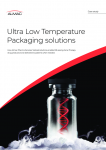EXCLUSIVE
CDMO and CRO must become one so clinical research can evolve: Quotient.

Speaking to Outsourcing-Pharma.com, he said the current working relationship between sponsor companies and service providers is too lengthy and costly because it is based on ideas that are up to a century old, and have never “evolved”.
But by combining CRO (contract research organisation) and CDMO (contract development and manufacturing) activities, Egerton told us the development paradigm becomes much smoother and more efficient.
“Traditionally there has been a vertical approach to early phase drug development and discover: manufacturing and testing – which can be split equally into CDMO and CRO activities,” he said.
“Quotient has a horizontal approach, where we do all the drug production and testing work is done in our own facility so we can manufacture tablets, capsules, solutions, suspensions ect up until the day before we need them for testing.”
He also said that because there is no to and fro between manufacturer and researcher, the model means service providers can respond rapidly to the emerging data.
“And because products are produced in such small scale there is a significant cost saving,” he added.
However, he warned that big strategic deals already in place could be a hindrance to the evolution of the clinical service industry.
Though with project teams crying out for more flexibility to try new paradigms, he added: “I do believe the industry will move in this direction, slowly but surely.
“I feel big strategic deals between Big Pharma and large CROs have short term economic benefits, and there is an increasing amount of frustration within project teams at the big sponsors about the level of flexibility this allows.”
More innovation
Egerton told us that as well as collaborating to form a new research, development and manufacturing monster, service providers will also be expected to provide more innovation in the future.
“We’re already seeing this quite a lot, with the bigger pharmas outsourcing a lot of their R&D activities, and smaller biotechs who don’t have the internal skill set,” he said.
“I think from the service provider’s perspective it will allow us to become more involved in the decision making process.”
Problems with the old system
The biggest problem with the traditional paradigm, Egerton told us, is that companies are obliged to manufacture the product well in advance in order to run studies, because of constraints added by having separate manufacturing and research capabilities.
He noted three key problems in particular: firstly that the product is often manufactured before the toxicology tests have been completed which means “a committment to spending money on molecules, some of which will fail the toxicology analysis.”
Secondly, producing products in advance means it has to have a long shelf life, again more time and money.
Finally, firms must make an “educated guess” as to what does forms will be required in clinical trial, he said.
“Again it means more money early on, potentially spending more than you need to, then when you get into the study you often have to make compromises over the required dosage because you cannot create the exact one you need,” Egerton added.
M&A in early phase CDMOs and CROs would be the way forward, he told us.














